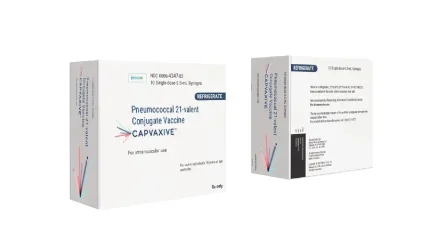
Merck, known as MSD outside of the US and Canada, has received the US Food and Drug Administration (FDA) approval for Capvaxive (pneumococcal 21-valent conjugate vaccine).
Capvaxive is a 21-valent pneumococcal conjugate vaccine indicated for active immunization for the prevention of invasive disease and pneumonia in adults 18 years of age and above.
The vaccine protects against invasive disease caused by Streptococcus pneumoniae serotypes 3, 6A, 7F, 8, 9N, 10A, 11A, 12F, 15A, 15B, 15C, 16F, 17F, 19A, 20A, 22F, 23A, 23B, 24F, 31, 33F and 35B.
Also, it prevents pneumonia caused by S. pneumoniae serotypes 3, 6A, 7F, 8, 9N, 10A, 11A, 12F, 15A, 15C, 16F, 17F, 19A, 20A, 22F, 23A, 23B, 24F, 31, 33F and 35B.
Merck said that its Capvaxive is specifically designed to protect against eight key serotypes that are mostly responsible for adult invasive pneumococcal diseases (IPDs).
The eight unique serotypes that cause IPD include, 15A, 15C, 16F, 23A, 23B, 24F, 31 and 35B.
US FDA approved Capvaxive under its accelerated approval pathway, based on immune responses as measured by opsonophagocytic activity (OPA), after granting Priority Review.
The continued regulatory approval for this indication can be expected upon verification and description of clinical benefit in a confirmatory trial.
Furthermore, the vaccine is not advised for administration to individuals with a history of a severe allergic reaction to any component of Capvaxive or diphtheria toxoid.
Merck scientific advisory committee member and Emory University professor emeritus of medicine, epidemiology, global health and paediatrics Walter Orenstein said: “Complications from invasive pneumococcal disease can lead to hospitalization, organ damage and even death.
“Many cases of adult disease are caused by serotypes not included in other approved pneumococcal conjugate vaccines.
“Capvaxive is designed to include the serotypes that cause the majority of invasive pneumococcal disease in adults, helping to protect adults against invasive pneumococcal disease and pneumococcal pneumonia.”
In a separate development, Merck received the US FDA approval for Keytruda plus carboplatin and paclitaxel, followed by Keytruda alone, to treat endometrial carcinoma in adults.
The FDA approval is supported by data from the Phase 3 NRG-GY018 trial (KEYNOTE-868), which evaluated Keytruda plus carboplatin and paclitaxel followed by Keytruda alone.
In the study, the Keytruda combination and monotherapy reduced the risk of disease progression or death by 40% in patients whose cancer was mismatch repair proficient (pMMR).
The treatment also reduced the risk in 70% of patients whose cancer was mismatch repair deficient (dMMR), compared to placebo plus carboplatin, paclitaxel followed by placebo alone.
Study principal investigator Ramez Eskander said: “This is the first Phase 3 trial to statistically evaluate anti-PD-1 immunotherapy plus chemotherapy combination in patients with pMMR and dMMR tumours as two independent cohorts.
“The addition of pembrolizumab to chemotherapy represents a new frontline therapeutic option for patients with primary advanced or recurrent endometrial carcinoma, demonstrating a statistically significant and clinically meaningful progression-free survival benefit compared to chemotherapy alone, regardless of mismatch repair status.”






